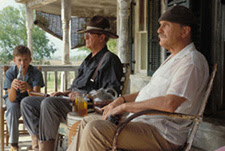That's #awkward in Farsi (or at least it's supposed to be), and that's what might be trending this week in Iran, where earlier this week, Foreign Minister Mohammed Javad Zarif tweeted his announcement of the country's nuclear deal with the United States that will end decades-long economic sanctions against Iran. Good news except that the Iranian government blocks its citizens from using any type of social media.
If that's not awkward enough, then maybe a Facebook friend request from Ayatollah Ali Khamenei, Iran's current Supreme Leader and Shia Cleric, might have you questioning your next post (revolution or cute cat photo? revolution? cute cat?). Yep, everybody who's anybody in Iran is racking up his Klout score.
NPR discussed two of the world's most unexpected online presences earlier this week, when it explored "Iranians React To Nuclear Deal On Social Media." When asked if Iran would soon be freely allowing its citizens access to the web, Babak Rahimi, associate professor of communication, culture and religious studies at the University of California, San Diego, said the hardliners in Iran will not allow it, continuing to fear that social media would support the type of unrest that facilitated the tumultuous Arab Spring and changed the political face of the region.
HOWEVER, those same hardliners, according to Rahimi, will be using social media to debate opponents and communicate their messages to supporters.
Interestingly, a Huffington Post blog, citing that social media caused a change in Tunisia and Egypt so quickly that opposition parties had no opportunity to develop leadership to fill the void, recommended that Arab countries consider "digital brainstorms," similar to the discussion hosted by IBM for 300,000 of its closest confidants, to provide input on their new governments.
Amazing that social media can generate such fear and respect, where oppressive governments forbid their citizens access yet use its power to spread their message. Iran also may have learned a lesson from the Arab Spring and recognized a need to be part of the message instead of its clueless victim.
To take a page from Sun Tzu, author of The Art of War, or "The Godfather," if you prefer: "Keep your friends close but your enemies closer."
Follow me on Twitter: @FWgib








